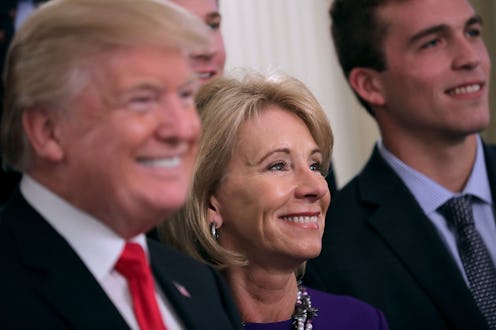
Allegations that a man, who's being called "John Doe," sexually harassed a woman during an off-campus party back in April resulted in his semester-long suspension. But seeing as he denies the allegations, he's now suing the University of Vermont for supposedly discriminating against men. And in order to defend himself, the student accused of sexual harassment quoted Betsy DeVos, Trump's secretary of education. His case, which was filed in November, even deployed DeVos' description of Barack Obama-era anti-sexual abuse guidelines as a "failed system."
The lawsuit filed by the accused argues there was no evidence to support claims that the plaintiff was guilty.
In the face of Jane Doe’s criticism that UVM was not doing enough for female students, the University’s administrators chose to make an example of John Doe, even though there was no evidence to support it, or corroborate, Jane Doe’s false allegations against him.
"UVM’s procedures for adjudicating sexual misconduct complaints is precisely the type of system referenced in DeVos’ statement," the lawsuit goes on to explain. The plaintiff's lawyers are presumably referring to the speech the education secretary made in September when she took direct aim at Title IX.
Title IX was first mandated in 1972 as an ordinance to address and rule out sexual abuse and discrimination on campuses. Later on, it was extensively used during Obama's presidency to assess on-campus reported cases of sexual discrimination and violence. In September, DeVos called it a "failed system" that was replete with "intimidation and coercion."
The plaintiff's case also maintains that “UVM students accused of sexual misconduct, like John Doe, have no meaningful opportunity to be heard and no meaningful right to an appeal." It insists that instead, the accused is "presumed guilty from the start.”
In response to being accused of failing to provide the student an impartial system, the university's spokesperson Enrique Corredera defended the school.
The university is committed to eliminating, preventing, and addressing the effects of sexual harassment and misconduct, and to providing a fair and impartial process for investigation and adjudication of reported incidents.
... The university is confident it has acted legally and appropriately. Not surprisingly, the plaintiff’s claim, appearing in various news outlets, provides only one part of the story. The university looks forward to its opportunity to present the facts and the relevant law governing this case in a public court of law.
In September, DeVos said that she wanted to "revise" the guidelines meant to provide students with a system that could address sexual violence on campuses. Although the Secretary of Education said that she wanted to hear "both" sides, she made a point of highlighting perceived abuses against accused individuals and said, "Every student accused of sexual misconduct must know that guilt is not predetermined" and pointed to people "who are wrongfully accused." She also called the proceedings that took place under Title IX "kangaroo courts."
To "revise" Title IX, DeVos proposed a different system known as "Notice and Comment" which would "incorporate the insights of all parties," according the education secretary. In addition to "Notice and Comment," DeVos also proposed a "Regional Center" which would work as a "voluntary, opt-in center where professionally-trained experts handle Title IX investigations and adjudications." This would, according to DeVos, fight against the perceived shortcomings of "school-based tribunals."
So far, DeVos' proposals have yet to produce any major change in the way schools and colleges curb sexual violence. Just one look at research from anti-sexual assault organizations suggest American campuses need a change — and they need it quickly. According to The Rape, Abuse, and Incest National Network (RAINN), sexual violence on college campuses is disturbingly common. For example, there are reportedly two sexual assaults for every one case of robbery on campuses. But after DeVos' September speech, it seems as if concern is shifting away from sexual violence survivors and more towards the accused.